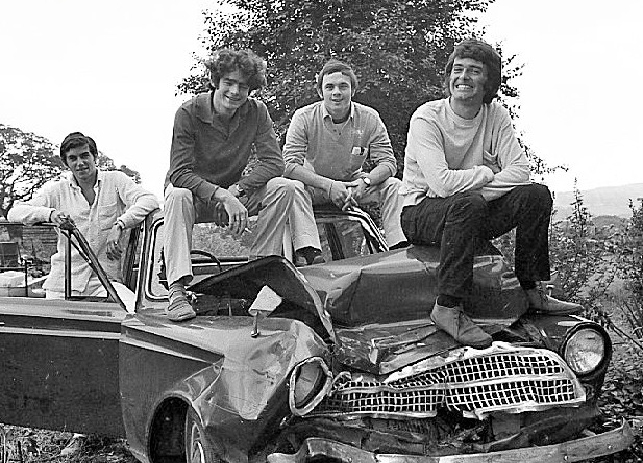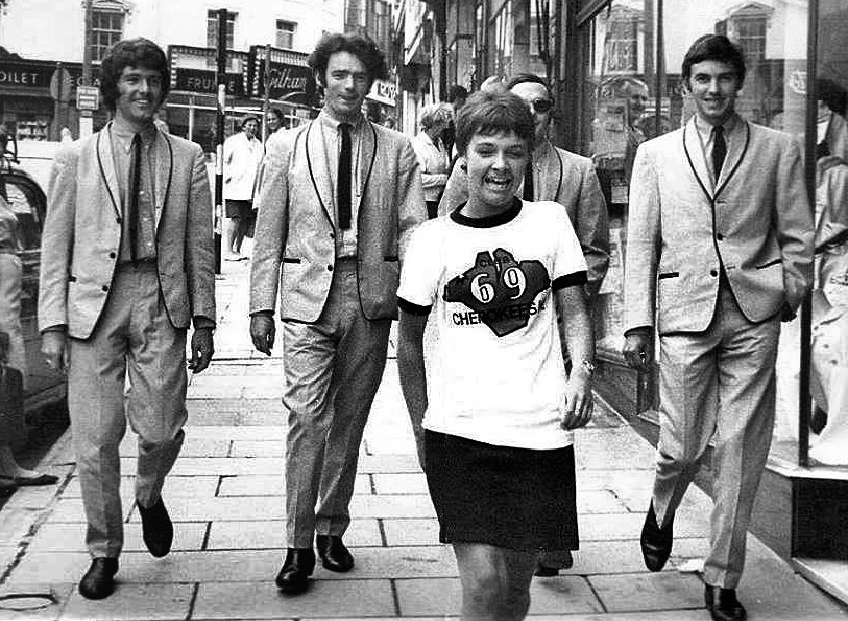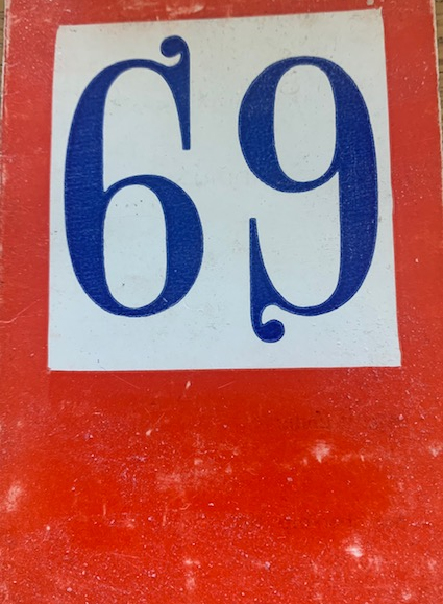The Cherokees
by Brian SharpeAnyone who spent their teens in the 60s on the Isle of Wight will remember The Cherokees. To some extent, certainly to my peer group - the Island's Beatles. This article is the third in the series "When Rock and Roll came to the Isle of Wight". Brian Sharpe , lead guitarist, tells the story.
Moving on from last month's contribution from Keith Roberts, but from the same starting point, 1957, let's trace how local ballrooms and bars, then steeped in ballroom dancing and Not Very Real Ale respectively, were gradually persuaded, by the prospect of improving their dwindling takings, to embrace the new, demonic Rock and Roll music.
I should point out that most of the local dance band musicians I encountered at the time were very supportive of the efforts of us young, largely untutored musicians, helping us to learn our trade - perhaps in the (usually vain) hope of persuading us into the light from the dark side.
However there was still a marked reluctance on the part of the ballrooms' owners to employ nondescript bunches of teenaged noise-makers in their establishments.
And so a group of Saunders-Roe apprentices, led by Mick Horne, who had formed a group (not a band!) called The Cherokees hired the Queens Hall in Newport and promoted highly successful Rock and Roll dances every week, despite the venue being an ale-free zone.
 Inspired by their success, a couple of 19 year-olds, "Flash" Ash and Pete Cooper, formed Ash / Cooper Enterprises. At the same time, at Sandown Grammar School, we formed a group called Les Paysans (Martyn Ford, Graham White, Crann Davies, Rob Young and myself) and they booked us to play in the ballroom at the end of Sandown pier. We enjoyed a very successful summer there.
Inspired by their success, a couple of 19 year-olds, "Flash" Ash and Pete Cooper, formed Ash / Cooper Enterprises. At the same time, at Sandown Grammar School, we formed a group called Les Paysans (Martyn Ford, Graham White, Crann Davies, Rob Young and myself) and they booked us to play in the ballroom at the end of Sandown pier. We enjoyed a very successful summer there.
The evolution of The Cherokees was complex. Suffice it to say that by 1963, the best known line-up of Graham Betchley, Crann Davies, Brian Sharpe and Ken Young had been formed. The band was still playing, on Musicians' Union rates (we had all joined, on the advice of our friends in the dance band community!), in such venues as The Monteagle Hotel in Shanklin (promoted by renowned jazz saxophonist Bob Howarth, who encouraged us to jam with him and his dance band friends, including Danny Hitchcock, Leon Simmonds, and my cousin Cyril Daish). This venue was packed every Sunday afternoon despite having no liquor licence. Other venues included The Lakeside Inn in Wootton and The Manor House in Lake, where the incident occurred which effectively changed the course of local popular music history.
Inspired by my school friend and guitarist in Ventnor band The Alley Cats, Graeme Collins, we had written and had begun to feature a guitar instrumental number which we aptly named "Friday Night At Lakeside". At one of our regular Saturday bookings at The Manor House I made the mistake of announcing that we were about to play "Friday Night At Lakeside". The proprietor construed this as our deliberately advertising a rival venue, and summarily dismissed us, never to darken his door again. Our drummer, Ken Young, viewed this as an opportunity, and by the following Saturday had negotiated a weekly gig at the Savoy Dive Bars in Sandown, importantly arranging for the band to organise the door and keep the takings. Gold at the end of the High Street!
The Cherokees continued to play at other venues, for more meagre rewards, until we were contacted one Saturday afternoon by a promoter from London, called Leo, who organised regular Trad Jazz dances at The Royal York Hotel in Ryde, which we all used to attend regularly.  His band for the evening had let him down, and he urgently needed a replacement. We were glad to oblige!
His band for the evening had let him down, and he urgently needed a replacement. We were glad to oblige!
Despite our not being a Trad Jazz band the evening was a huge success, so much so that the hotel's proprietor, Les Meddick, agreed, following clever negotiating by Ken, to allow us to organise the door and keep the takings. Ken's brother Ray had just left the Royal Air Force and was persuaded to take on the responsibility of organising cashiers and security (Ryde was not always entirely peaceful at that time!).
Over a few pints in the public bar of the York it was agreed to make entry to the dances available only to members, and The 69 Club (don't ask) was born. The following summer we were denied the use of the York ballroom due to the annual boarders, so with the help of Les Meddick we set up a limited company, and we rented from British Rail, refurbished, and redecorated the Seagull Ballroom at the wet end of Ryde pier. Les Paysans had earlier done a season there when it was managed by author Philip Norman's father ("Babycham Nights" was located there – well worth a read!). With the help of friends and family we operated the food and liquor licensed premises 24 / 7 for the whole summer, returning to the York the following winter. The 69 Club operated until 1970 at various venues including The Manor House (yes, they let us operate the door!), The Ventnor Winter Gardens, The Oasis in Ryde (Josie Wellspring let us have her new ballroom rent free for one summer if we agreed to dig the footings.)
Cherokees personnel
(gleaned from the excellent Isle of Wight Rock book, compiled and written by Vic King, Mike Plumbley and Pete Turner):
1957-1958:
Mick Horne, Gil Palmer or Pete Mackett, Colin (Chick) Leal, Dave Head, Dave Holmes or Pete Hale. This was effectively the Saunders-Roe apprentices house band, and they promoted a dance every Saturday at the Queens Hall in Newport (parts of which are still visible at the back of Boots), with Mauri George on the door and Mo Carr providing the amplifiers (apart from Chick's, who made his own). At this time Ken Young was already in The Nomads, and Mick Horne joined them occasionally.
 1958-1959:
1958-1959:
Brian Sharpe, Martyn (Floss) Ford, Crann Davies, Rob Young and Graham White had formed Les Paysans at Sandown Grammar School, and when Chick became ill I was drafted in to fill his place in the Cherokees. When Chick's illness became prolonged this turned out to be a permanent replacement, and both bands ran in parallel. Rob's brother John was helping out in Les Paysans when I was on Cherokees duty, and Les Paysans played once at the Queens Hall with John in the line-up. Bill Wills joined the Cherokees on drums, and for a time Pat Marshall, an excellent Royal Army tenor sax player stationed at Camp Hill, joined the band, now consisting of Mick Horne, rhythm guitar, Dave Head, double bass, Bill Wills, drums, Pat Marshall, sax, and Brian Sharpe, lead guitar.
1960-1962
Shortly after this Mick, Bill, Pat and Dave decided to leave, and Mick asked Ken and Floss to join on drums and bass. Mick Horne was a talented craftsman, and made me a beautiful guitar to replace my home-made one, and a shark-shaped glass-fibre bass guitar for Floss.
Mick recruited a sharply dressed young singer called Codge Atkinson, who stayed with the band until Ken and I heard Graham Betchley singing with the Invaders at the Hotel Ryde Castle. Gray sang "Only Make Believe", and was obviously in a different league to Codge (he was the first to admit it!), so we poached him.
1963-1970
In 1963 Floss went away to university, Crann stepped into the breach, and the Cherokees line-up most people remember was born, and lasted until we decided we could no longer compete with DJs and discos!


